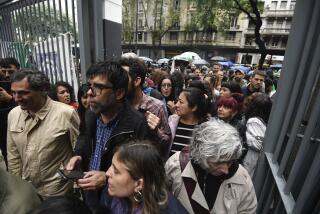Argentina Takes Emergency Steps to Cut Inflation : Wages, Prices Are Frozen as Negotiators Seek Eased Terms for Foreign Debts
- Share via
BUENOS AIRES — Hard-pressed by renewed inflation, the Argentine government returned to its economic roots Wednesday, reimposing a freeze on prices and wages as “an emergency measure.”
While Argentine negotiators in New York sought easier repayment terms from commercial banks for the nation’s crushing $53-billion foreign debt, Economy Minister Juan Sourrouille also announced a 6.7% currency devaluation during an address broadcast to the nation.
The new program paralleled an anti-inflation assault launched 20 months ago and known as the Austral Plan.
“In the face of increasing inflation in the past two months and the consequences it could have in the immediate future, the government has decided to freeze prices and wages. This is, of course, an emergency measure,” Sourrouille said in a broadcast that quickly brought attack from both left and right.
Levels of Last Monday
Prices were frozen to their levels of last Monday. To protect the public’s purchasing power, the government ordered a 13% increase in the minimum wage, and increased private and public sector salaries to keep pace with inflation that reached 7.6% in January and is expected to be around 6.4% this month--rates that would mean annual inflation of more than 100%.
To offset the cost to the government, Sourrouille said the price of gasoline and cigarettes would rise 15% and those of utilities and other public services by 2%.
The new program devalued the Argentine currency--the austral-- making it worth 1.535 to $1. Sourrouille said that level would be maintained for March and April, with a 2% devaluation to follow in May and another in June.
“It is necessary to consolidate stability,” Sourrouille said.
He told Argentines that the government would also reduce domestic interest rates, eliminate import duties on goods not produced in the country and waive duties on capital goods and high technology items needed to modernize the industrial sector.
Citing renewed growth that he attributed to the success of the Austral Plan in stemming inflation that had been running at 1,000% annually, Sourrouille also announced the signing of a contract between the national oil company and Esso for petroleum exploration in the southern reaches of the country.
Foreign Debt Talks
Sourrouille referred only indirectly to foreign debt talks, asserting that “an attack on inflation through recession and the fall of real wages does not form part of this government’s methodology.”
To sustain growth that reached 5.5% last year after a prolonged recession but returned living standards only to levels first achieved 15 years ago, the government of President Raul Alfonsin is asking creditor banks for $2.15 billion in new money and an eased repayment schedule.
Although the Austral Plan proved successful against inflation, the Alfonsin government is broadly faulted for its failure to overcome the structural causes of an inflation that has dogged Argentina for more than three decades.
Wednesday night, Sourrouille conceded that “structural reforms have not had the impetus that the crisis requires.
“We intend to devote greater energies to structural change,” he said, “but it is clear that we must count on a more serene economic climate less charged with the uncertainties provoked by accelerating inflation.”
Sourrouille, whose ministry is attempting to sell off some of the government’s white elephant industries, promised a 20% reduction in public sector employees over the remaining three years of Alfonsin’s presidential term.
Like the original Austral Plan, Sourrouille’s presentation Wednesday rankled Argentine rightists and leftists alike. The right wants less government intervention in the economy; the left wants more.
“More controls, just the reverse of what we wanted,” said Roberto Favalevic, president of the Argentine Industrial Union. Said labor leader Osvaldo Borda: “An old movie. The workers lose again.”
More to Read
Sign up for Essential California
The most important California stories and recommendations in your inbox every morning.
You may occasionally receive promotional content from the Los Angeles Times.










